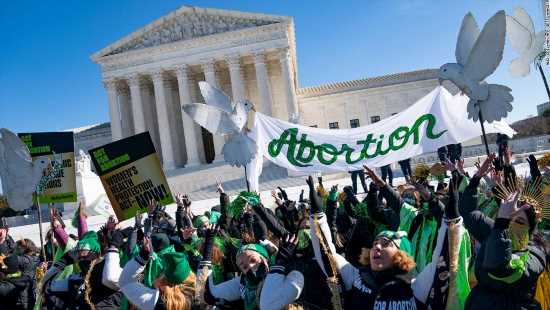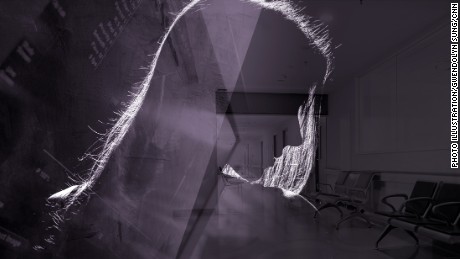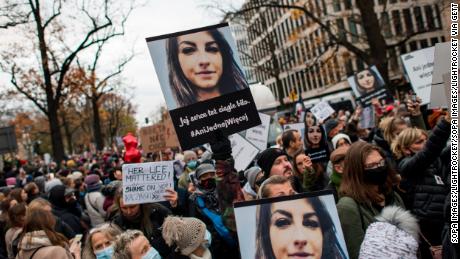Meg Schurr.
(CNN)Meg Schurr was 22 years old when she says she was sexually assaulted.
A college student in New York with the dream of working in public health, Schurr’s life came to a grinding halt when she discovered she became pregnant as a result of the assault in 2014.
“My pregnancy couldn’t have been more unplanned or unwanted — it resulted from an encounter that I didn’t want to have and asked to stop,” Schurr told CNN.
Abortion felt like her only option. But Schurr, raised in a conservative Catholic household, was terrified of what that meant.
“I was afraid to rely on just Planned Parenthood’s information — because I had been told my whole life how biased they were, and how they only provided abortion services for profit,” Schurr said, referring to the falsehoods pushed against the nonprofit sexual and reproductive health care provider that offers abortion services.
But scrolling through websites of crisis pregnancy centers, which sometimes rely on misinformation to dissuade women from having abortions, only scared her more. Ultimately, Schurr’s doctor referred her to a Planned Parenthood clinic.
“I was free to make my choice without hesitation or barriers just because I was lucky enough to live in the NYC metro area,” said Schurr, who now works as an administrative assistant for the reproductive rights think tank Guttmacher Institute.
The freedom to make that choice is something many Americans don’t have; one people like Schurr are fighting for.
Republican-majority legislatures — including those in Oklahoma, Idaho and Arizona — have passed a flurry of new restrictions on abortion in recent weeks. They range from limiting access to abortion to making it a felony to perform or attempt to perform the procedure. In many of these cases, the legislation does not provide exceptions in cases of rape, incest or medical emergency.
In December, the Supreme Court heard oral arguments on one of its most important cases in decades – one that is considered to carry the future of abortion rights in the United States in the balance. A final ruling is expected in June.
A decision that overturns current Supreme Court precedent on abortion rights — and one that specifically reverses the landmark 1973 Roe v. Wade opinion — could lead to new bans on abortions being implemented, and existing bans being upheld in states across the country.
Proponents of such legislation often invoke religious doctrine and values, viewing abortion as tantamount to murder. But abortion rights activists say the decision whether or not to give birth is personal and enshrined in civil liberties. They also say abortion access can save lives.
“Abortion is a human right,” Schurr said. “The political attacks on our fundamental right to abortion — the right to bodily autonomy, the right to chart our own course in life, the right to protect our health and well-being — are grossly unconstitutional, immoral, disgraceful and pathetic.”
While protests for abortion rights often come in the form of rallies, donations and political action, there’s another weapon some are wielding: their stories.
Activists say ‘Shout Your Abortion’
In 2015, after Republicans in Congress attempted to defund Planned Parenthood, Amelia Bonow took to Facebook with her own abortion story. Inspired to tell the truth, she shared her experience with no “sadness, shame or regret.”
Her Facebook post was shared by fellow feminist and social justice activist Lindy West, who added the hashtag #ShoutYourAbortion. Within days, the hashtag went viral, with thousands of women nationwide adding their own stories.
The goal of the social media campaign, Bonow told CNN, was to “create ways for people to share their abortion stories and normalizing abortion in culture at large.”
Now, Shout Your Abortion (SYA), a nonprofit abortion rights organization co-founded by Bonow and West, shares thousands of stories from people of all ages, races and gender identities.
“We are out here. We are having abortions, and we are talking about them, at whatever volume we choose,” the Shout Your Abortion website says. “It’s time for us to take back our own stories.”
Despite the controversy surrounding abortion, it is a common health intervention in the United States, according to the World Health Organization (WHO). Six out of 10 of all unexpected pregnancies end in abortion, WHO reported in 2021.
About one in four American women will have an abortion by the age of 45, according to the Guttmacher Institute.
But because abortion is considered taboo, most people don’t share their experiences, SYA says, which leads to feelings of shame, guilt and isolation. Avoiding the subject also creates an environment rife with misinformation and, ultimately, harmful legislation.
That’s why SYA believes sharing stories, as well as supporting and funding clinics, is key to protecting abortion rights.
“We believe that doing all these things openly, to whatever degree a person is comfortable doing so, is the way we will build a broad and uncompromising base of support for abortion access,” Bonow said. “We need to start thinking about abortion access as a community responsibility.”
For some, the discussion may feel too public, too open. But women like Arielle Cohen disagree.
In 2012, Cohen was a college student at SUNY Purchase — a campus leader with dreams of becoming a writer.
When she became pregnant mid-semester, with only $1,000 left to last her until the end, an abortion felt like her only choice.
“I wouldn’t be the person I am today if I hadn’t been able to get the money together for those two pills,” Cohen told CNN.
Sharing her experience wasn’t easy, Cohen says, noting abortions are hard to get, hard to pay for and hard to talk about.
“The stigma and isolation I faced made me extremely depressed,” she said. “I was embarrassed that I was depressed and felt ashamed for not knowing how to talk about it.”
“I am still deeply troubled by the overwhelming stigma that I faced, that so many in my place still face,” Cohen said.
Joining the #ShoutYourAbortion movement has allowed Cohen to see firsthand the impact sharing her story has had on others.
“Today, I am really proud to say I had an abortion,” Cohen said. “I’m proud to know that when I spoke out about it publicly for the first time it created a domino effect where other people told me their stories for the first time. I am honored to hold those stories for others.”
A long road ahead
Heather Young remembers being 17 and facing the crowd outside of a clinic in Middletown, Ohio, where she had a surgical abortion.
“The procedure wasn’t bad, the clinic was quiet and very clean,” Young, now 23, told CNN. “I’ll never forget the protesters outside ranting about Jesus… all the looks and stares I got as I went in.”
She recalls lying on the table as a nurse held her hand, talking Young through every step of the procedure and never letting go of her once.
“Even though it was a difficult period in my life, I’ll never forget the amazing people who helped me access the care I needed and deserved,” she said.
Young also feels the men and women shouting outside the clinic didn’t know enough about her situation to pass judgment.
As a high school student, Young says she was already struggling with mental health issues and financial problems when she became pregnant.
“The guy that got me pregnant immediately switched from seemingly loving and sweet to mean,” she said.
“I absolutely did not want to bring a child into the world with how young I was and definitely not with the person I laid down with,” she said.
Young says she’s thankful for the kindness of the clinic staff, as well as all the women who inspired her to share her abortion story. Only by doing so, she says, will the subject become easier to address.
“We need to quit tip-toeing around the word abortion,” Young said. “People need to know that people have abortions for all reasons, not just life or death situations. I was 17, scared. I would probably not be here today if it wasn’t for my mother and doctors who helped me.”
The campaign Bonow and West started has made great strides since 2015.
Along with sharing thousands of abortion stories, the group is now focused on raising awareness about abortion pills to help expand abortion access, especially to patients who live in states where it’s been restricted.
The group has a long road ahead, with recent legislation including one measure in Oklahoma that would impose a near-total ban on abortion. But SYA says their work is more important than ever, and the fight for justice will continue, one story at a time.
“I’m not ashamed that it took me years to say it,” Cohen said. “I’m not ashamed that it was hard. I’m not ashamed that I still think about all aspects of it. I’m not ashamed that it was painful. And I’m not gonna shut up about it.”
Source: Read Full Article






